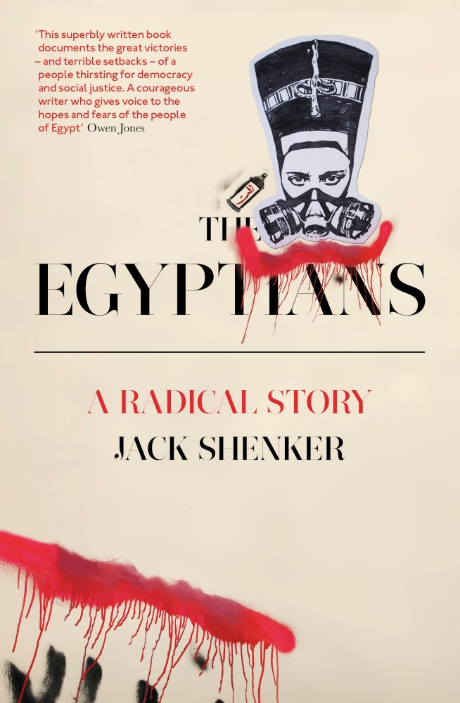Modern Pharaohs

In the six years since Egyptians rose up and overthrew President Hosni Mubarak, who had ruled under emergency law since 1981, their country has been led by two more strongmen, one Islamic and the current one, Abdel Fattah el-Sisi, a former defense minister. As soon as one ghastly head is removed, another crops up, like the Hydra of ancient myth.
Is it possible that Egypt, which has been a nation state since the tenth millennium B.C., isn’t ready for democracy, that it still requires a pharaoh to rule it? In the “election” held just months before he was deposed, Mubarak’s National Democratic Party won an unbelievable 96 percent of the vote. The voters certainly didn’t believe it.
Many observers argue that Egypt is back to square one and fated to remain there, that an uneasy “stability” is preferable to what might succeed it. Jack Shenker, the author of "The Egyptians: A Radical History of Egypt’s Unfinished Revolution," disagrees.
He writes, “[A]lthough the political gains that accompanied the first wave of revolution have largely been reversed, Egypt exists today in a prolonged moment of flux, in which the long-running custodians of the state are continually trying to stitch their stronghold back together and rule as if nothing has changed — as if all of Egypt was still Mubarak Country — while significant portions of the citizenry exist within an entirely new political culture that no longer accepts the structure of the old state at all.”
An award-winning journalist who writes for The Guardian newspaper, Shenker has reported from Egypt for nearly a decade. He authoritatively documents, and places in historical context the political upheavals that have shaken it after January 25, 2011. Indeed, he was often right in the midst of them, shoulder to shoulder with protesters, getting tear-gassed, beaten, and arrested along with them. His understanding of Egypt and its people is visceral as well as intellectual.
The author’s encounters with average citizens — whether farmers, fishermen, students, or factory workers — who have felt the brunt of a capricious and uncaring government are the most compelling parts of the book. For example, in 2014, on the third anniversary of the initial uprising, 18-year-old Mahmoud Hussein was arrested, tortured and jailed for wearing a “celebratory scarf” sporting the words “Nation Without Torture.” At the time he was writing the book, Shenker reports that the teenager had been “held in detention for more than 500 days without charge.”
As abhorrent as he finds Egypt’s political mores, the author maintains that it is a faltering economy that is the main cause for recent unrest. As with many citizens around the globe, rich Egyptians are getting richer and poor ones poorer. In 2008, when labor strikes were proliferating, the national minimum wage remained unchanged since 1984.
Shenker lays the blame for Egypt’s increasingly inequitable economy largely on Western neoliberal economic theory and its emphasis on market fundamentalism. He charges that the notion of what is good for big business is good for Egypt is putting the interests of international capitalists, wealthy Egyptians, and Western banks ahead of struggling citizens.
One example he cites is recent agriculture policy and the reversal of land reforms once championed by Gamal Abdel Nasser, who also was a strongman but a beneficent one for average Egyptians. The current emphasis on cash crops for export has exacerbated the country’s spiraling food costs, argues Shenker, who points out that Egypt, once an exporter of grain, is now the world’s largest grain importer. A prime slogan of the 2011 protesters was “Bread, Freedom, and Social Justice.”
Some readers may find the author’s relentless advocacy and attacks on conventional wisdom wearing. He castigates Western leaders and journalists who have promulgated the narrative that the Egyptian revolution is a black-and-white struggle between “Islamists” and “enlightened secular forces,” that stability, however imperfect, is preferable to "chaos."
While Shenker prophesies that the revolution is far from over, he doesn’t provide any sense of what it will usher in if it is ultimately successful. Admittedly that’s a tall order, but minus such speculation a “don’t worry, be happy” impression is left regarding the fire next time.
Even those who are sympathetic to Shenker's criticism of the status quo may find this book lacking in balance. A 2013 Pew Research Center study reported some disturbing attitudes among Egyptians: Three quarters of those surveyed believed sharia law should be applied to Muslims and non-Muslims alike, and the majority of those favored the cutting off of the hands of thieves (70%) and the stoning of adulterers (81%).
Democracy in Egypt, if and when it comes, will still have to wrestle with the question of Islam’s role, and the rights of minorities, in governance.